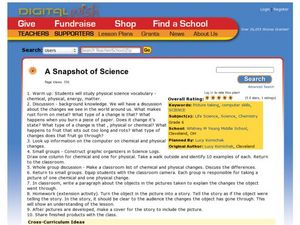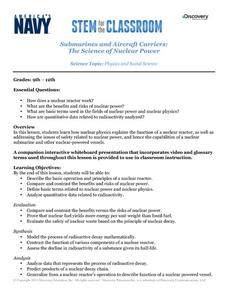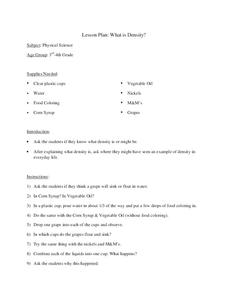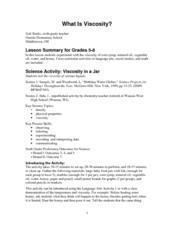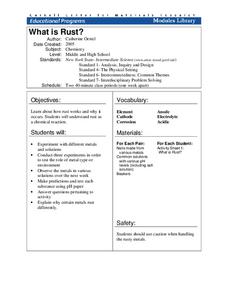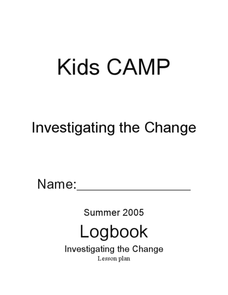Baylor College
How Can We Find Out What Is in Water?
Using paper chromatography, water watchers discover that several substances might be dissolved even though they aren't visible. In this case, you will prepare a mixture of three different food colorings for them to experiment with. A...
Curated OER
What is Physical Fitness?
First graders explore and discuss what physical fitness actually is, its benefits and how to obtain it through a variety of ways. They summarize the five parts of physical fitness: cardiovascular endurance,muscular strength, muscular...
Curated OER
A Snapshot of Science
Sixth graders explore physical and chemical changes. In this physical science lesson plan, 6th graders study vocabulary, discuss the changes they see in the world and look up information on chemical and physical changes. Students create...
Curated OER
Physical Science: The Three Billy Goats Gruff
Explore science through problem solving and learning how to solve the problem of the story "The Three Billy Goats Gruff." Young investigators will learn how to construct a model and design a solution. They will also keep records of their...
American Chemical Society
What is a Chemical Reaction?
When a candle burns down, what happens to the mass that appears to be shrinking? Lesson begins with a demonstration of the chemical reaction of a candle burning. Then scholars use atom models to observe conservation of mass...
Wind Wise Education
What is the Cost of Inefficiency?
What does it cost to keep the lights on? Through a hands-on activity, class members use a watt meter and determine the amount of energy different types of light bulbs use. The class then determines the financial and environmental...
Discovery Education
Submarines and Aircraft Carriers: The Science of Nuclear Power
As physics masters view this presentation, they learn how nuclear power is used in submarines. They use Google Maps to plot a course through the ocean and calculate the time required for surfacing and traveling. They learn about fission,...
Foundation for Water & Energy Education
How is Flowing Water an Energy Source? Activity B
Explore the world's water without leaving the classroom! In this second of three uncomplicated but wonderful activities, physical science learners feel the pressure of water. They discover that the deeper the water, the stronger the...
Curated OER
Physical Science- Sink or Float?
Learners investigate which objects sink and which ones float. Learners engage in an experiment, make predictions, and record results on a graphic organizer. This is a comprehensive and easy to follow resource.
Foundation for Water & Energy Education
What is the Water Cycle? Activity B
Curious physical scientists follow a lesson on the properties of water with this lesson on distillation. They observe a miniature water cycle model that filters dirty water into clean water. These two lessons combined are an enriching...
Baylor College
What is Blood Pressure?
Find out how we describe the force created by the blood against the walls of the vessels in a heart-pumping lesson! As part of a unit on the heart and circulatory system, cardiology kids use a blood pressure monitor to find their...
Curated OER
What is Density?
Young scholars explore physical science by conducting an in-class experiment. In this density lesson, students define vocabulary terms dealing with physics and discuss their knowledge of density. Young scholars conduct several "sink or...
American Chemical Society
Mysterious M&M's
The first in a six-lesson mini unit, all using M&Ms® candies, this physical science activity gets kids to observe a single piece and discover what happens when it is placed in a plate of water. The activity can be used to...
NOAA
What Little Herc Saw
See the underwater world through a different pair of eyes! Middle school marine biologists identify deep-sea organisms by examining images taken by an ROV from the Okeanos Explorer. After determining what creatures lie beneath the...
Curated OER
What Is Viscosity?
Students experiment with the visocosity of corn syrup, mineral oil, vegetable oil, water, and honey. They research viscosity before beginning. Pupils draw the conclusion that the marble sinks more slowly in the liquids with greater...
Curated OER
Refraction B2—When is Light Reflected Internally?
Physics is phun in this lesson. Young physicists use a lightbox to test how and where light is refracted and reflected as it travels through transparent materials. Angles of incidence and refraction, sine of both angles, and the...
Curated OER
What is Plastic?
Students experiment with plastics. For this what is plastic lesson, students make a simple polymer and discuss recycling. Students identify various types of plastics.
Foundation for Water & Energy Education
What is the Water Cycle? Activity A
Hydrologists create a concept map about how water is used and a sentence strip defining water and describing its unique properties. Small groups work together to fill a small milk carton and compute the mass of water inside. The next...
Curated OER
Physical Changes and States of Matter - One
Third graders study the three states of matter and identify the physical changes that take place between them. There is an initial teacher-led demonstration followed by a meaningful whole-class inquiry. These two activities should lead...
Center for Learning in Action
Introducing Physical and Chemical Changes
Young scientists investigate chemical and physical changes to the states of matter—gas, liquid, and solid—as well as solutions and suspensions with a variety of demonstrations, grand conversation, and an interactive quiz to check for...
Cornell University
What Is Rust?
Why do metals rust differently? Scholars experiment with metal combinations in a hands-on activity. They create unique environments with different metals and compare the rate and amount of rust for each.
Curated OER
Investigating the Change
Sugar crystal growth is observed as an example of physical change and cabbage juice pH indicator is used to demonstrate chemical change. The crystal growth is tracked over five days. The cabbage juice experiment is involved and can also...
Curated OER
What is Science?
Students explore physical science by conducting a plant experiment. In this scientific method lesson, students discuss questions scientists ask in order to properly explore certain subjects. Students utilize two plants and place one in...
Curated OER
What Do Koalas Need to Survive?
First graders take a field trip and examine the Koala and his habitat. In this Koala instructional activity, 1st graders read Possum Magic and discuss the foods of Australia. Students view the habitat of a Koala and record...


